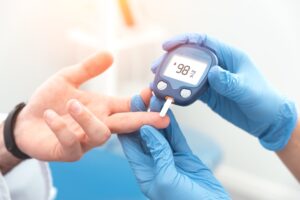Diabetes MSc (University of Wolverhampton)
Master diabetes care with this flexible, expert-led MSc—perfect for healthcare professionals aiming to lead in clinical diabetes practice.
Overview
This MSc in Diabetes from the University of Wolverhampton is tailored for healthcare professionals aiming to deepen their understanding and clinical skills in diabetes care. Delivered in collaboration with CardiffMed, this online, flexible programme fits seamlessly into busy medical careers. You'll gain advanced knowledge in the prevention, diagnosis, and management of diabetes, supported by evidence-based teaching and real-world case applications. Graduates emerge with enhanced clinical judgment, leadership potential, and the ability to shape better outcomes for patients globally.
Entry Requirements
Since our courses are conducted entirely online, they are accessible to both UK and international registered healthcare professionals.
Applicants will typically hold a first degree or equivalent (including international qualifications) in a relevant professional healthcare field, such as a medical or nursing degree.
Registered healthcare professionals without these recognised qualifications will be considered on an individual basis and a wide range of prior experience may be taken into account. In some cases, applicants may be asked to submit a piece of work for assessment in order to confirm that they are able to work comfortably at postgraduate level, and demonstrate the requisite clinical and professional knowledge.
- A copy of your updated CV including your address and date of birth.
- A copy of your undergraduate degree certificate.
- The name and email address of someone who is able to provide a reference, this can be a work colleague, employer or former tutor.
- A detailed personal statement explaining why you would like to undertake the course.
- A copy of your proof of English competency (see below).
Proficiency in the English language is also essential to completing our courses. If English is NOT your first language, we ask for proof of competency during the application process. We are able to accept an IELTS (with an overall score of 6.5 and a minimum of 6.0 for each band) or an equivalent qualification.
If you do not meet these requirements, please don’t worry, you can also contact our admissions team on admissions@cardiffmed.com for more information on the qualifications we accept.
Should you have already successfully completed the 1 year Postgraduate Diploma and wish to convert to the MSc and complete only the second year of the program this is possible. Please contact our admissions department info@cardiffmed.com to find out more.
Key Facts
- University of Wolverhampton
- Starting Date: 1st September 2025
- Application Deadline : 29th August 2025
- Class Size : 15 - 20
- Duration : 24 months
- Commitment : Part-time
- Format : 100% Online
Course Fees
- Deposit for September 2025: £485 †
- Total Course Fees for UK & International Students for September 2025: £10,200 ††
Payment Options
- Option 1: Upfront Payment in full. Pay-in-full discount is available.
- Option 2: Apply for Interest-free payments each month for the duration of the course.
Payment Plan Breakdown
First Year Payments
| Deposit | 10 Monthly Payments | Final Payment |
| £485 † | £483 | £485 |
Total first year payments: £5,800
Second Year Payments
| 11 Monthly Payments | Final Payment |
| £366 | £374 |
Total second year payments: £4,400
You may also be interested in:
- Spread the cost with Lendwise, who offer financing options for up to 8 years. ††††
† Deposits are non-refundable
†† Prices are subject to review following each intake
†††† Subject to eligibility criteria.
Course Modules and Learning Outcomes
The MSc diabetes online programme spans 2 years and consists of seven modules (180 credits) with the first 120 credits spread across six 20-credit modules in year 1. The second year of the master’s in diabetes begins with an initial eight-week online module that will develop essential skills in critical appraisal and knowledge of research methodologies. You will then complete a professional project, which consists of a 1,000-word proposal and an 11,000-word professional project (dissertation).
Year 1
Module aims:
To critically analyse the precision diagnosis, classification, and personalised presentation of diabetes, with a person-centred approach.
To evaluate the epidemiology and pathophysiology of diabetes mellitus through research and evidence-based understanding.
To understand the driving factors for Type 2 diabetes.
To understand the fundamentals of obesity.
Module content:
- Glucose metabolism
- Definition of diabetes
- Incidence and prevalence
- Aetiology
- Diagnostic criteria of diabetes, its classification, presentation and epidemiology
- To make precision diagnoses of diabetes types and classify them appropriately (ie.: Genetic diabetes, ketosis-prone diabetes (KPD), secondary diabetes)
- Obesity and metabolic syndrome
- Screening for diabetes
Module outcomes:
- Critically evaluate the diverse types, diagnostic criteria, and clinical presentations of diabetes, including genetic, autoimmune, and obesity-related forms.
- Analyze epidemiological trends, pathophysiological mechanisms, and statistical concepts related to diabetes and its complications.
Module aims:
This module aims to synthesize a critical and applied understanding of diverse approaches to delivering personalized diabetes care, including multidisciplinary collaboration in complex and unpredictable situations.
Module content:
- The interrelationship between obesity and diabetes
- Behavioral change in diabetes management
- Exercise and nutrition in diabetes management
- Structured educational program in type 1 and type 2 diabetes
Module outcomes:
- Develop personalized strategies for behavioral change, exercise, and nutrition management in individuals with diabetes, considering psychological and educational aspects.
- Critically evaluate the roles and impact of multidisciplinary teams and structured educational program in delivering comprehensive diabetes care.
Module aims:
This module aims to tidally analyze the evolving landscape of pharmacological interventions in diabetes management, shifting towards a comprehensive approach emphasizing cardio-renal-metabolic control and protection, and equip students with knowledge of emerging therapeutic horizons beyond glycemic control.
Module content:
- Oral medication in the management of T2DM
- Non-insulin injectables
- Pivotal studies
- Insulin-based therapies
Module outcomes:
- Synthesize knowledge of the mechanisms of action, evidence base, and clinical applications of pharmacological interventions for type 2 diabetes, with a focus on cardio-renal protection.
- Integrate practical considerations and emerging approaches in insulin-based therapies for effective management of type 1 and type 2 diabetes.
Module aims:
This module aims to critically evaluate the increasing role of technology in enabling precision and personalized diabetes care, and develop practical competencies in the application of technological advancements for effective management of type 1 and type 2 diabetes, while addressing the unique challenges of diabetes as a comorbidity across various medical disciplines.
Module content:
- Technology and diabetes: from theory to practice
- Management of specific conditions
- Inpatient diabetes management
Module outcomes:
- Critique the practical applications of technology in diabetes management, including insulin delivery systems, continuous glucose monitoring, and ambulatory glucose profile interpretation.
- Develop personalized management strategies for specific conditions related to diabetes, such as gestational diabetes, drug-induced diabetes, and genetic forms of diabetes and obesity.
Module aims:
This module aims to critically appraise the short and long-term complications of diabetes, considering the perspective of the person with diabetes. This module will also prepare students to evaluate the evidence base and apply strategies for the prevention, delay and treatment of diabetes complications.
Module content:
- Short-term complications: hypoglycemia and hyperglycemia
- Short-term complications: diabetic ketoacidosis (DKA) and hyperosmolar hyperglycemic nonketotic syndrome (HHNS/HONK)
- Management of home emergencies in diabetes
- Long-term complications: microvascular disease and diabetic retinopathy/maculopathy
- Long-term complications: diabetic nephropathy and neuropathy
- Long-term complications: sexual dysfunction and comprehensive management strategies
Module outcomes:
- Illustrate proficiency in recognizing and managing acute metabolic complications associated with diabetes.
- Exhibit mastery in recognizing and managing microvascular complications of diabetes and evaluate strategies for prevention and treatment.
Module aims:
This module aims to develop an in-depth understanding of risk factors and comprehensive management approaches for macrovascular complications, considering the perspective of the person with diabetes.
Module content:
- Macrovascular disease in diabetes: overview and epidemiology
- Cardiovascular disease and diabetic foot management
- Cardiovascular risk factors and their management
- Primary and secondary preventative measures
- Treatment targets and interventions
- Clinical trials, data interpretation and critical evaluation
Module outcomes:
- Utilize the evidence base to identify and assess risk factors for macrovascular complications in individuals with diabetes.
- Critically appraise and apply clinical trial evidence in the comprehensive management of macrovascular complications in diabetes.
Year 2
Aims of the module:
The Research Methodologies and Critical Appraisal element of the module will help students recognize, understand, interpret and apply methods used in healthcare research and critically appraise the various methodologies related to the specialty.
The Professional Project Proposal and Professional Project elements will develop students’ ability to critically appraise specific areas of clinical, research and/or organizational practice and develop skills in independent research, study and writing for publication.
Content summary:
Research Methodologies and Critical Appraisal
- Terminology used in epidemiology and research studies such as prevalence, incidence, sensitivity, specificity, false positive and false negatives.
- Interpreting graphical representation of epidemiological and statistical data such as Kaplan-Meier curves, forest plots and meta-analyses.
- Calculations used in the assessment of research data such as relative risk, absolute risk and number needed to treat. Statistical tests and their applications including t-tests, ANOVA and chi-square.
- Qualitative research methods.
- Fundamentals of evidence-based practice and its application into the clinical setting.
- Principles of health economics, audit and quality improvement/assurance systems.
- Establishing patient registers and the value of disease-specific registers.
Research into educational principles for both healthcare practitioner and patient.
Professional Project
This module will depend on the creation of a piece of work based upon a specific clinically related project relevant to the student’s practice. This project may comprise:
- Literature review and appraisal of the evidence.
- Audit of practice including organizational or clinical.
- Review and implementation of evidence-based practice.
- Qualitative or quantitative research (formal research involving human subjects is not anticipated).
- Case(s)-based and quality of service review with critical appraisal.
- Case report, review of literature and organizational assessment.
Learning outcomes
Students will be able to:
- Critically evaluate and synthesize diverse methodological approaches and research tools to formulate and investigate complex questions within a chosen field of practice.
- Critically analyze current practice and suggest improvements or changes in a relevant healthcare setting.
- Design and undertake a professional project related to the field of practice in order to produce an extensive piece of literature which may be suitable for peer-reviewed publication.
Validated and Faculty From Trusted Institutions
Validating partner

University of Wolverhampton
Faculty

Dr Vinay Eligar
Program Leader
Assessment Methods
This programme emphasises learning through active participation in case-based discussions, reflection, and real-life scenarios. Students engage with clinical cases that mirror everyday practice, fostering problem-solving and evidence-based application from the very beginning.
Across the modules, assessments are integrated with learning. Each week, you will work through two to three clinical cases, discussing and reflecting on them with peers under the guidance of an expert tutor. These discussions form the core of your learning and are also the basis for your assessments.
Our innovative teaching methods are designed to help you translate this learning into real-world clinical practice. You’ll need to regularly log in to participate in discussions, ideally daily, and commit approximately two hours per day to your studies. Our dedicated Student Support Team is available to assist with any challenges you may encounter, from navigating our online platform to managing deadlines.
How Foundational Knowledge is Developed
The programme is structured so that foundational knowledge is introduced through carefully designed clinical cases. Each case is crafted to highlight essential concepts and progressively deepen your understanding as you apply critical thinking and evidence-based analysis. This hands-on approach ensures that you are not only acquiring theoretical knowledge but also learning how to apply it in a practical, clinical setting.
This programme is suited for professionals who thrive in an online, discussion-based learning environment. Please note that this course focuses on interactive, applied learning through peer collaboration and case discussions. You will be fully supported, encouraged, & led through the programme to success and graduation!
Year 1
- Every week students are presented with two/three clinical case-based scenarios that are reflective of every day clinical practice and research.
- Tutors will post a number of questions and prompts to aid students in a formal discussion of each case.
- These discussions are facilitated throughout by your tutor and are then assessed at the end of every module.
For this assessment, students will work on a group assignment and/or an individual assignment.
- Group assignments are designed to hone skills in the multidisciplinary, holistic approach to modern treatments and patient management by requiring group participation in a single piece of work.
- Individual assignments are designed to hone skills in academic career progression through such tasks as reviewing papers, developing scientific posters or abstracts, peer-reviewing, social media activities, patient information leaflets and essays.
The reflective journal is used by students throughout each module to monitor personal progress. This is guided by weekly feedback from your tutor and is graded at the end of every module. The journal typically includes the following:
- Initial expectations and reasons for taking the course.
- Module and/or personal learning objectives.
- Description of events, issues and learning points within current personal practice.
- Change in every day practice due to knowledge gained on each module.
- A description of what has been learned during the module.
- Students are provided with case-based problems in the form of a one-hour timed examination.
- The exam consists of 30 'Single Best Answer' questions.
- Students are required to complete the exam online within the set time.
Why Study Diabetes Master's with CardiffMED
100% Flexible
Our courses are 100% online. No fixed study times mean you can log in and learn whenever and wherever.
Multidisciplinary – study in a group of doctors, nurses, pharmacists and other healthcare professionals.

Career Boosting
Get a University-validated postgraduate qualification in just 1 calendar year instead of 2 academic years.
40% of our alumni reported a salary increase 2 years after studying with us.

Expert Led
All of our programmes are authored and developed by world-leading experts in their field.
Our faculty are selected due to their subject expertise, experience, and teaching abilities to ensure the highest standards of educational excellence.

This MSc in Diabetes is designed for healthcare professionals who wish to take their expertise in diabetes care to a higher level, focusing on leadership, advanced clinical practice, and research. It is particularly suitable for:
Nurses
This MSc offers nurses advanced clinical and leadership skills, empowering them to take on specialist roles, lead diabetes care teams, and contribute to developing comprehensive diabetes management strategies in clinical practice.
GPs and General Physicians
The MSc equips GPs with in-depth knowledge of advanced diabetes management, precision medicine, and emerging technologies. This allows them to provide holistic and cutting-edge care, improving long-term outcomes and enhancing their ability to manage complex cases across primary and secondary care settings.
Dietitians and Clinical Nutritionists:
This MSc expands their expertise in nutrition’s role in managing and preventing diabetes, offering a deeper understanding of personalised nutrition plans, cutting-edge research, and collaborative care approaches, enabling them to lead in the design of dietary strategies for diabetic patients.
Pharmacists
This MSc deepens pharmacists understanding of diabetes medications, new therapies, and patient-centred pharmacological care. It enables them to become leaders in diabetes medication management, advising healthcare teams on best practices and supporting patients with complex medication regimens.
Physician Associates (PAs)
The MSc offers advanced training in diabetes management, giving PAs the ability to take a leadership role in patient care, develop comprehensive management plans, and contribute to research and innovation in diabetes treatment.
Public Health Professionals
Public health professionals working on diabetes prevention and intervention programmes will benefit from this MSc by gaining advanced insights into diabetes as a public health issue. The programme equips them with the skills to develop and implement evidence-based public health strategies to reduce diabetes prevalence and improve community health outcomes.
Occupational Therapists
This MSc offers a more comprehensive understanding of how diabetes affects physical function and well-being, enabling them to design more effective interventions that improve patients' quality of life and independence in managing their condition.
You'll learn through our flexible, interactive online platform, which allows you to engage with clinical cases, complete assignments, and collaborate with fellow students at times that suit your schedule. There's no fixed timetable—simply log in daily to participate in the week's activities.
Our teaching approach is highly interactive, using small groups of 10-20 students to foster a collaborative environment where you can engage in thoughtful discussions and receive guidance from your tutor. You'll have access to learning resources and discussion forums that encourage ongoing interaction and deeper engagement with the material.
Throughout your studies, you'll receive support from a dedicated expert tutor and our Student Support Team, ensuring you have the resources needed to navigate the course successfully.
Why Enroll in This Program
Awarding University
University of Wolverhampton
Why CardiffMED for Diabetes MSc?
CardiffMed, in collaboration with the University of Wolverhampton, delivers high-quality diabetic education tailored for working professionals. With expert-led teaching, flexible learning, and global recognition, we’re committed to your clinical growth.





